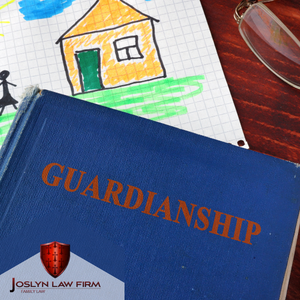Ohio Guardianship Lawyer
 The well-being and security of our loved ones remain a top priority for most of us. Knowing that they are looked after and provided for gives us peace of mind and satisfaction. But it also benefits our loved ones in that they are cared for and can rest assured that decisions are being made in their best interest. Guardianship, or the legal process where a person is appointed by the court to make decisions on behalf of a family member or loved one, is often used to accomplish those goals for the elderly, mentally challenged, and children under 18 years of age.
The well-being and security of our loved ones remain a top priority for most of us. Knowing that they are looked after and provided for gives us peace of mind and satisfaction. But it also benefits our loved ones in that they are cared for and can rest assured that decisions are being made in their best interest. Guardianship, or the legal process where a person is appointed by the court to make decisions on behalf of a family member or loved one, is often used to accomplish those goals for the elderly, mentally challenged, and children under 18 years of age.
Because guardianship is a legal process, you will have to ask the court to be appointed a guardian for your loved one. Joslyn Law Firm has extensive experience representing families in need of guardianship. As one of the premier family law firms in Ohio, we take great pride in representing our clients vigorously and with compassion. We understand that family law matters can be difficult, and we strive to treat our clients like they are a member of our family. Trust Joslyn Law Firm and reach out to us today by calling (888) USA-RIGHTS or contacting us online.
Book a Free Consultation Today
Ohio Guardianship Information Center
What Is Guardianship?
Guardianship is best understood as a legal way for one person to be put in charge of the well-being of someone who is unable to care for themselves (also known as a ward). To be sure, guardianship is not a way to control someone or keep them from doing the things they want to do. And it is different from a power of attorney. Guardianship should only be used to provide care and protection for someone who is unable to do those things for themselves. The most common example where guardianship is used is when an elderly loved one becomes unable to care for themselves. In these cases, the person needing a guardian usually has diminished physical or mental capabilities.
Guardianship can also be used in connection with managing a person’s estate. This means that the guardian will be in charge of the finances of the person that they have been appointed to protect. A guardian of an estate is usually necessary in cases where a person does not have the mental capacity to make sound decisions concerning their finances. As with all guardianships, the guardian is only allowed to make decisions in the best interest of the person they have been appointed to protect.
Types Of Guardianship
Guardianship can be sought for several types of situations. In every situation, the guardian is bound by law to do what is in the best interest of their ward. If it can be shown that the guardian failed to do so, then they can be removed from that role by the probate court. Here are a few types of guardianship:
Guardian Of A Person – This type of guardianship is typically used to provide care and protection for a loved one who can no longer do so for themselves. The guardian is responsible for the day-to-day care of the ward and is typically awarded physical custody. Guardians can be appointed for any person who has demonstrated that they cannot care for themselves.
Emergency Guardian – In cases where a person is an immediate threat to themselves, a temporary emergency guardian may be appointed. Unlike most other forms of guardianship, an emergency guardian is typically appointed without a formal court hearing.
Guardian Of An Estate – As mentioned earlier, this type of guardianship is not over a person but instead controls the finances of a person who is incapable of handling them independently. For instance, a parent of a child that has been given significant assets or income may be appointed the guardian of that child’s estate.
Interim Guardian – At any point, a current guardian can resign or be removed by the probate court. When this happens, and there is no immediate replacement, the court may appoint an interim guardian until a permanent replacement can be found.
Conservator – While technically a type of guardianship, a conservator is different from other forms of guardianship in that the ward’s consent is necessary for someone to be appointed conservator. Additionally, conservatorship ends once the ward no longer can consent or decides they no longer want a conservator. Conservators are bound by the same duty to their wards as are guardians.
Limited Guardian – This type of guardianship can be used if the ward is capable of some aspects of their care but requires a guardian for others. In those cases, the probate court can appoint a guardian for limited purposes.
Joslyn Law Firm attorneys can explain guardianship law, the guardianship process, and how guardianship impacts you and your loved one’s legal and financial affairs. We could also represent you at a guardianship hearing, striving to ensure a smooth transition for you and your loved one. For more information about guardianship and elder law, you may wish to set up a consultation with our Columbus, Ohio guardianship lawyers.
When Is Guardianship Needed?
While each situation is different, there are a few common scenarios where guardianship will be necessary. Still, consulting with an experienced family law attorney will be the best resource in determining if guardianship is the best fit for you and your family. Some of the more common situations where guardianship may be necessary are:
Physically And/Or Mentally Diminished Elderly Loved Ones – While some of our elderly loved ones are sharp and independent up until the end, many of them experience a diminished capacity at some point. This can especially be true for seniors that experience dementia. Guardianship might be necessary if your elderly loved one no longer has the mental ability to make sound decisions surrounding their care and safety.
Disabled Children/Loved Ones – If you are the parent of a disabled person, you may need to be appointed their guardian if they cannot make decisions and care for themselves. This scenario applies primarily to parents of disabled children that have reached the age of 18.
Minors under 18 years of age – Children that lose their parents due to death or abandonment may need to have a guardian appointed to care for them until they reach adulthood. As with most guardianships, family members are usually preferred for this role.
Handling The Finances Of A Minor – Child actors and children that inherit significant assets or income may need a guardian to be in charge of their finances. This does not mean that the money is now the guardian’s property; instead, the guardian must make sure the money is handled in a way that is in the best interest of the child.
In all of the above scenarios, a guardian is only needed when the ward is incapable of being responsible for themselves. This means that they have shown an inability to make sound decisions concerning their safety, physical care, or financial well-being. The guardian’s job in every guardianship is to make decisions for the ward that is in their best interest.
How To Be Appointed A Guardian
Typically, the probate court is responsible for appointing guardians. Family members and loved ones are preferred over individuals with no tie to the ward. Still, being appointed a guardian will involve court filings and potentially appearing in front of a judge. It is important to understand that while the guardian is empowered to make decisions on behalf of the ward, the guardian ultimately must answer to the court. This means that if the court orders the guardian to take a certain action, he/she must obey the court’s demand.

To be appointed a guardian, you must be able to show that the ward is incapacitated. This means that it will need to be proven that the ward cannot make sound decisions regarding their safety, well-being, health, and/or finances. Typically, a medical doctor will need to verify the ward’s mental and/or physical condition to show that they are incapacitated. Simply because your loved one did not take your healthcare advice will likely not be enough to prove incapacity.
Because the process of being appointed a guardian will likely involve going to court and making legal arguments, it is strongly recommended that you consult with an experienced family law attorney before you petition the court. The state of Ohio has specific laws that govern the probate process that only an experienced family law attorney is qualified to interpret and apply to your specific situation. Just as important, guardians are bound by law to do certain things and to abide by a standard that is set by the court. This means that if a guardian does not understand their role or fails to do what the law says they must, then they may face the consequences from the court.
What Does A Guardian Do?
What a guardian does is different depending on the type of guardianship they are appointed to. For most guardians, their role is to ensure that their ward is properly cared for and to make decisions in their ward’s best interest. This can include obtaining the proper medical care, securing a suitable living situation, and making decisions concerning the ward’s income and assets. While the guardian can consider the ward’s wishes, they are not required to follow them.
For guardians in charge of an estate and/or the financial well-being of their ward, the guardian is required to properly manage those finances. That means that the guardian must make sure that the ward’s bills are paid and their assets are handled correctly. Similarly, if a ward has a debt, the guardian is responsible for making sure that debt is valid and, if so, paying it off. If a ward is owed money, then it is the guardian’s job to collect on that debt. Lastly, if a ward is being sued, the guardian will be responsible for obtaining counsel and defending against the lawsuit.
Guardians Can Be Removed
It is important to understand that being named a guardian by the court carries obligations and responsibilities that are not optional. This means that if it can be shown that a guardian failed to live up to those standards, they may be removed. A guardian can be removed proactively by the court or at the request of a third party. If a third party wants to remove a guardian, they will need to file a petition with the probate court. Removing a guardian is a legal process that will likely involve proving to the court that the current guardian failed to properly fulfill their duties. Some possible reasons for a guardian to be removed are:
Financial Mismanagement – Guardians have a fiduciary duty to their ward. This means they must manage their finances responsibly and ethically. Placing a ward’s assets into a risky investment that causes a major loss could be considered a breach of that fiduciary duty and grounds to be removed.
Inadequate Care Of The Ward – A significant number of individuals that need guardianship are elderly and in poor health. In those cases, the role of the guardian is to ensure that they receive the proper medical care. Failing to do so could be grounds for removal.
Fraud – Sometimes, guardians are appointed based on fraudulent circumstances. What generally happens is the person who is appointed guardian lies or falsifies information to make the court believe that the ward was incapacitated. Lying to the court and submitting fraudulent information is grounds for removal and may also cause criminal charges to be filed against the guardian.
Guardians that are found to have acted improperly can not only be removed but may also be held liable for the harm they caused their ward. This means that a guardian that stole their ward’s money may be forced to pay it back. Similarly, a guardian that mismanaged funds or caused the ward to incur significant debt may be forced by the court to repay what was lost.
When your loved one cannot handle personal and financial affairs, you may wish to become your loved one’s legal guardian. Yet you may wonder about your loved one’s rights relating to legal guardianship and how becoming a guardian will affect your life. Consider speaking with an attorney at Joslyn Law Firm to learn more about guardianship. Our Columbus, Ohio, guardianship lawyers pride ourselves on how we practice family law with compassion. Suppose you have questions about how guardianship impacts your personal and financial affairs. Speak to a Columbus guardianship attorney at Joslyn Law Firm to learn more.
Frequently Asked Questions
My Elderly Loved One Is In Poor Health. Should They Have A Guardian?
 It depends. A guardian is generally needed when your loved one can no longer care for themselves. But this does not mean that every sick person should have a guardian. The law says that guardians should be appointed if the person is incapacitated. This usually means that your loved one either has a diminished mental capacity or has shown an inability to physically care for themselves.
It depends. A guardian is generally needed when your loved one can no longer care for themselves. But this does not mean that every sick person should have a guardian. The law says that guardians should be appointed if the person is incapacitated. This usually means that your loved one either has a diminished mental capacity or has shown an inability to physically care for themselves.
Yes. Any person is eligible to be appointed a guardian. Still, it is important to understand that family members are generally preferred. When appointing a guardian, the court will look at several factors to determine if you are fit to serve as a guardian. If the court determines that you are capable and there are no objections, then you can be appointed guardian even if you are not related to the ward.
Are Guardians Paid?
In some circumstances, guardians can be compensated for their time. They will need to petition the court for compensation, and if approved, it will be deducted from the ward’s estate. To be sure, guardian compensation must be reasonable, and some courts may limit it to a certain percentage of the ward’s assets. If the ward does not have any assets, the court may provide the guardian compensation from a special fund.
Is Training Required?
A guardian of an adult must be familiar with the fundamental training and the continual training requirements. Guardians must show the court that they have completed this training unless specifically exempted.
How Is Guardianship Terminated?
Guardianship only exists when there is a need. This means that guardianship is terminated when it is no longer necessary. This can occur if the ward dies or when the ward can care for themselves. At any time, the ward or a third party can ask the court to end the guardianship if it can be shown that it is no longer necessary.
Can I Ask For A Guardian To Be Removed Or Replaced?
Yes. Any interested party can petition the court to remove a guardian. Still, it must be shown that the guardian failed to perform their duties. You cannot ask for a guardian to be removed simply because you do not like them or think you could do a better job. The court will likely require evidence and argument to support your claim that the guardian has not fulfilled their responsibilities. You can also object to the appointment of the guardian at the initial probate hearing.
Does The Court Check Up On The Guardian?
Yes. Each year the guardian must check in with the court and certify a continued need for guardianship. At the initial stage, the guardian must file an inventory of the ward’s assets. Each year the guardian must show how they manage the ward’s finances and provide receipts for expenditures.
Hiring A Guardianship Attorney in Ohio
If you believe your loved one requires a guardian or you have concerns about how they are currently being cared for, then you may benefit from consulting with an experienced guardianship attorney. The lawyers at Joslyn Law Firm know how important your loved ones are to you and understand that you want them properly cared for. As one of the top law practices in the state, we pride ourselves on treating our clients like they are one of the family. We will do our best to ensure that your case is handled diligently and effectively. Reach out to us today by calling (888) USA-RIGHTS or by contacting us online.
What Our Clients Say
Read this 5-star Google review below regarding a complex family law case in Columbus OH
“Very kind and caring attorneys and staff. Would refer to anyone in need of a family law attorney.”
By: Abby Farber
Rating: 5/5 ⭐⭐⭐⭐⭐
Read more reviews on Google!
This page was last updated by Brian Joslyn

